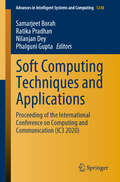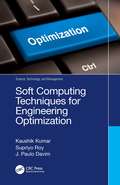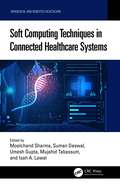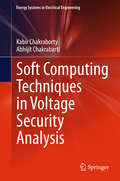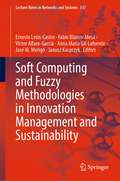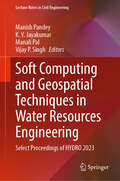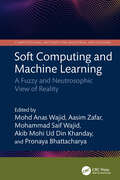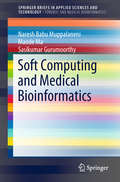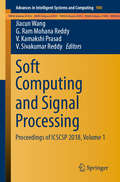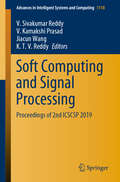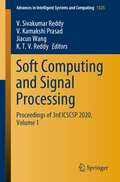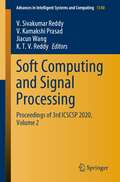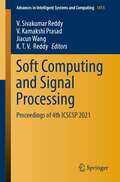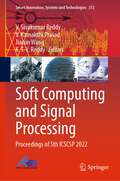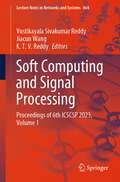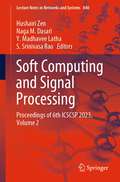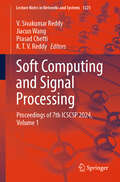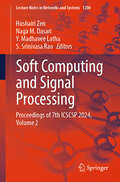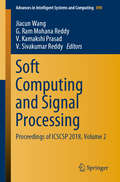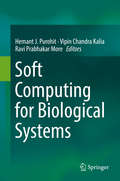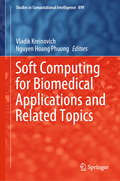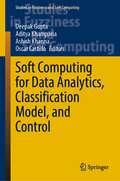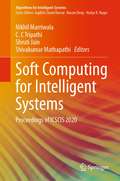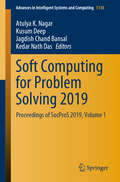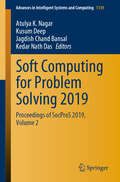- Table View
- List View
Soft Computing Techniques and Applications: Proceeding of the International Conference on Computing and Communication (IC3 2020) (Advances in Intelligent Systems and Computing #1248)
by Phalguni Gupta Nilanjan Dey Samarjeet Borah Ratika PradhanFocusing on soft computing techniques and application in various engineering research domains, this book presents the state-of-the-art outcomes from ongoing research works being conducted in various research laboratories and educational institutions. The included research works deal with estimated models and give resolutions to complex real-life issues. In the field of evolutionary computing and other domains of applications, such as, data mining and fuzzy logic, soft computing techniques play an incomparable role, where it successfully handles contemporary computationally intensive and complex problems that have usually appeared to be inflexible to traditional mathematical methods. Comprising the concepts and applications of soft computing with other emerging research domains, this book cherishes varieties of modern applications in the fields of natural language processing, image processing, biomedical engineering, communication, control systems, circuit design etc.
Soft Computing Techniques for Engineering Optimization (Science, Technology, and Management)
by J. Paulo Davim Kaushik Kumar Supriyo RoyThis book covers the issues related to optimization of engineering and management problems using soft computing techniques with an industrial outlook. It covers a broad area related to real life complex decision making problems using a heuristics approach. It also explores a wide perspective and future directions in industrial engineering research on a global platform/scenario. The book highlights the concept of optimization, presents various soft computing techniques, offers sample problems, and discusses related software programs complete with illustrations. Features Explains the concept of optimization and relevance to soft computing techniques towards optimal solution in engineering and management Presents various soft computing techniques Offers problems and their optimization using various soft computing techniques Discusses related software programs, with illustrations Provides a step-by-step tutorial on how to handle relevant software for obtaining the optimal solution to various engineering problems
Soft Computing Techniques in Connected Healthcare Systems (Biomedical and Robotics Healthcare)
by Umesh Gupta Moolchand Sharma Mujahid Tabassum Suman Deswal Isah A. LawalThis book provides an examination of applications of soft computing techniques related to healthcare systems and can be used as a reference guide for assessing the roles of various techniques. Soft Computing Techniques in Connected Healthcare Systems presents soft computing techniques and applications used in healthcare systems, along with the latest advancements. The authors examine how connected healthcare is the essence of combining a practical operative procedure of interconnectedness of electronic health records, mHealth, clinical informatics, electronic data exchange, practice management solutions, and pharmacy management. The book focuses on different soft computing techniques, such as fuzzy logic, ANN, and GA, which will enhance services in connected health systems, such as remote diagnosis and monitoring, medication monitoring devices, identifying and treating the underlying causes of disorders and diseases, improved access to specialists, and lower healthcare costs. The chapters also examine descriptive, predictive, and social network techniques and discuss analytical tools and the important role they play in enhancing the services to connected healthcare systems. Finally, the authors address real-time challenges with real-world case studies to enhance the comprehension of topics. This book is intended for under graduate and graduate students, researchers, and practicing professionals in the field of connected healthcare. It provides an overview for beginners while also addressing professionals in the industry on the importance of soft computing approaches in connected healthcare systems.
Soft Computing Techniques in Voltage Security Analysis
by Kabir Chakraborty Abhijit ChakrabartiThis book focuses on soft computing techniques for enhancing voltage security in electrical power networks. Artificial neural networks (ANNs) have been chosen as a soft computing tool, since such networks are eminently suitable for the study of voltage security. The different architectures of the ANNs used in this book are selected on the basis of intelligent criteria rather than by a "brute force" method of trial and error. The fundamental aim of this book is to present a comprehensive treatise on power system security and the simulation of power system security. The core concepts are substantiated by suitable illustrations and computer methods. The book describes analytical aspects of operation and characteristics of power systems from the viewpoint of voltage security. The text is self-contained and thorough. It is intended for senior undergraduate students and postgraduate students in electrical engineering. Practicing engineers, Electrical Control Center (ECC) operators and researchers will also find the book useful.
Soft Computing and Fuzzy Methodologies in Innovation Management and Sustainability (Lecture Notes in Networks and Systems #337)
by Anna Maria Gil-Lafuente Janusz Kacprzyk José M. Merigó Ernesto León-Castro Fabio Blanco-Mesa Victor Alfaro-GarcíaThis book provides recent research on soft computing and fuzzy methodologies in innovation management and sustainability. The uncertainty in the business world is increasing. Significant changes are generated unexpectedly, so using fuzzy logic and soft computing methods allows us to create flexible scenarios adaptable to new realities. Within the book, we will find different applications of fuzzy methodologies that can apply to various topics such as sustainability, innovation, tourism, costs, exports, systems administration, among others. The book's main contribution is the applicability of the various methodologies to specific cases, which allows generating a relationship between theory and practice. In addition, it has some bibliometric studies on various topics that give us a visualization of what has happened and where multiple topics are headed. This book is recommended mainly for students who wish to know how the various fuzzy and soft computing tools can be taken to real situations, allowing a better understanding of these and generating new visions of future applicability.
Soft Computing and Geospatial Techniques in Water Resources Engineering: Select Proceedings of HYDRO 2023 (Lecture Notes in Civil Engineering #397)
by Vijay P. Singh Manish Pandey K. V. Jayakumar Manali PalThis book comprises proceedings of the 28th International Conference on Hydraulics, Water Resources, River and Coastal Engineering (HYDRO 2023). It focuses on emerging opportunities and challenges in the field of soft computing and geospatial techniques in water resources engineering. The book covers a range of topics including, but not limited to, satellite-derived data for hydrologic applications, Geospatial Information System (GIS) and Remote Sensing (RS) applications in water resources management, rainfall and streamflow prediction, hydro-informatics, data-driven and artificial intelligent-based hydrological modelling, optimization of water resources systems. The book presents these topics in the form of illustrations and tables, thereby providing the readers with an in-depth insight into the recent research. It also addresses fundamental concepts and studies in the field of soft computing and geospatial techniques in water resources engineering, making it a valuable resource for researchers and professionals working in the fields of hydraulics, water resources and coastal engineering.
Soft Computing and Machine Learning: A Fuzzy and Neutrosophic View of Reality (Computational Methods for Industrial Applications)
by Pronaya Bhattacharya Mohd Anas Wajid Aasim Zafar Mohammad Saif Wajid Akib Mohi Ud Din KhandayThis reference text covers the theory and applications of soft computing and machine learning and presents readers with the intelligent fuzzy and neutrosophic rules that require situations where classical modeling approaches cannot be utilized, such as when there is incomplete, unclear, or imprecise information at hand or inadequate data. It further illustrates topics such as image processing, and power system analysis.This book: Discusses soft computing techniques including fuzzy Logic, rough sets, neutrosophic sets, neural networks, generative adversarial networks, and evolutionary computation Examines novel and contemporary advances in the fields of soft computing, fuzzy computing, neutrosophic computing, and machine learning systems, as well as their applications in real life Serves as a comprehensive reference for applying machine learning and neutrosophic sets in real-world applications such as smart cities, healthcare, and the Internet of Things Covers topics such as image processing, bioinformatics, natural language processing, supply chain management, and cybernetics Illustrates classification of neutrosophic machine learning, neutrosophic reinforcement learning, and applications of neutrosophic machine learning in emerging industries The text is written for senior undergraduate students, graduate students, and academic researchers in the fields of electrical engineering, electronics and communications engineering, computer science and engineering, and information technology.
Soft Computing and Medical Bioinformatics (SpringerBriefs in Applied Sciences and Technology)
by Naresh Babu Muppalaneni Maode Ma Sasikumar GurumoorthyThis book highlights the applications of soft computing techniques in medical bioinformatics. It reflects the state-of-the-art research in soft computing and bioinformatics, including theory, algorithms, numerical simulations, and error and uncertainty analysis. It also deals with novel applications of new processing techniques in computer science. This book is useful to both students and researchers from computer science and engineering fields.
Soft Computing and Signal Processing: Proceedings Of Icscsp 2018, Volume 1 (Advances in Intelligent Systems and Computing #900)
by V. Kamakshi Prasad Jiacun Wang G. Ram Mohana Reddy V. Sivakumar ReddyThe book presents selected research papers on current developments in the field of soft computing and signal processing from the International Conference on Soft Computing and Signal Processing (ICSCSP 2018). It includes papers on current topics such as soft sets, rough sets, fuzzy logic, neural networks, genetic algorithms and machine learning, discussing various aspects of these topics, like technological, product implementation, contemporary research as well as application issues.
Soft Computing and Signal Processing: Proceedings of 2nd ICSCSP 2019 (Advances in Intelligent Systems and Computing #1118)
by V. Kamakshi Prasad Jiacun Wang V. Sivakumar Reddy K. T. V. ReddyThis book presents selected research papers on current developments in the fields of soft computing and signal processing from the Second International Conference on Soft Computing and Signal Processing (ICSCSP 2019). The respective contributions address topics such as soft sets, rough sets, fuzzy logic, neural networks, genetic algorithms and machine learning, and discuss various aspects of these topics, e.g. technological considerations, product implementation, and application issues.
Soft Computing and Signal Processing: Proceedings of 3rd ICSCSP 2020, Volume 1 (Advances in Intelligent Systems and Computing #1325)
by V. Kamakshi Prasad Jiacun Wang V. Sivakumar Reddy K. T. V. ReddyThis book presents selected research papers on current developments in the fields of soft computing and signal processing from the Third International Conference on Soft Computing and Signal Processing (ICSCSP 2020). The book covers topics such as soft sets, rough sets, fuzzy logic, neural networks, genetic algorithms and machine learning and discusses various aspects of these topics, e.g., technological considerations, product implementation and application issues.
Soft Computing and Signal Processing: Proceedings of 3rd ICSCSP 2020, Volume 2 (Advances in Intelligent Systems and Computing #1340)
by V. Kamakshi Prasad Jiacun Wang V. Sivakumar Reddy K. T. V. ReddyThis book presents selected research papers on current developments in the fields of soft computing and signal processing from the Third International Conference on Soft Computing and Signal Processing (ICSCSP 2020). The book covers topics such as soft sets, rough sets, fuzzy logic, neural networks, genetic algorithms and machine learning and discusses various aspects of these topics, e.g., technological considerations, product implementation and application issues.
Soft Computing and Signal Processing: Proceedings of 4th ICSCSP 2021 (Advances in Intelligent Systems and Computing #1413)
by V. Kamakshi Prasad Jiacun Wang V. Sivakumar Reddy K. T. V. ReddyThis book presents selected research papers on current developments in the fields of soft computing and signal processing from the Fourth International Conference on Soft Computing and Signal Processing (ICSCSP 2021). The book covers topics such as soft sets, rough sets, fuzzy logic, neural networks, genetic algorithms and machine learning and discusses various aspects of these topics, e.g., technological considerations, product implementation and application issues.
Soft Computing and Signal Processing: Proceedings of 5th ICSCSP 2022 (Smart Innovation, Systems and Technologies #313)
by V. Kamakshi Prasad Jiacun Wang V. Sivakumar Reddy K. T. V. ReddyThis book presents selected research papers on current developments in the fields of soft computing and signal processing from the Fifth International Conference on Soft Computing and Signal Processing (ICSCSP 2022). The book covers topics such as soft sets, rough sets, fuzzy logic, neural networks, genetic algorithms and machine learning and discusses various aspects of these topics, e.g., technological considerations, product implementation and application issues.
Soft Computing and Signal Processing: Proceedings of 6th ICSCSP 2023, Volume 1 (Lecture Notes in Networks and Systems #864)
by Jiacun Wang K. T. V. Reddy Vustikayala Sivakumar ReddyThis book presents selected research papers on current developments in the fields of soft computing and signal processing from the Sixth International Conference on Soft Computing and Signal Processing (ICSCSP 2023). The book covers topics such as soft sets, rough sets, fuzzy logic, neural networks, genetic algorithms and machine learning and discusses various aspects of these topics, e.g., technological considerations, product implementation and application issues.
Soft Computing and Signal Processing: Proceedings of 6th ICSCSP 2023, Volume 2 (Lecture Notes in Networks and Systems #840)
by Hushairi Zen Naga M. Dasari Y. Madhavee Latha S. Srinivasa RaoThis book presents selected research papers on current developments in the fields of soft computing and signal processing from the Sixth International Conference on Soft Computing and Signal Processing (ICSCSP 2023). The book covers topics such as soft sets, rough sets, fuzzy logic, neural networks, genetic algorithms and machine learning and discusses various aspects of these topics, e.g., technological considerations, product implementation and application issues.
Soft Computing and Signal Processing: Proceedings of 7th ICSCSP 2024, Volume 1 (Lecture Notes in Networks and Systems #1221)
by Jiacun Wang V. Sivakumar Reddy K. T. V. Reddy Prasad ChettiThis book presents selected research papers on current developments in the fields of soft computing and signal processing from the Seventh International Conference on Soft Computing and Signal Processing (ICSCSP 2024), organized by Malla Reddy College of Engineering & Technology, Hyderabad, India. The book covers topics such as soft sets, rough sets, fuzzy logic, neural networks, genetic algorithms, and machine learning and discusses various aspects of these topics, e.g., technological considerations, product implementation, and application issues.
Soft Computing and Signal Processing: Proceedings of 7th ICSCSP 2024, Volume 2 (Lecture Notes in Networks and Systems #1200)
by Hushairi Zen Naga M. Dasari Y. Madhavee Latha S. Srinivasa RaoThis book presents selected research papers on current developments in the fields of soft computing and signal processing from the Seventh International Conference on Soft Computing and Signal Processing (ICSCSP 2024), organized by Malla Reddy College of Engineering & Technology, Hyderabad, India. The book covers topics such as soft sets, rough sets, fuzzy logic, neural networks, genetic algorithms and machine learning and discusses various aspects of these topics, e.g., technological considerations, product implementation and application issues.
Soft Computing and Signal Processing: Proceedings of ICSCSP 2018, Volume 2 (Advances in Intelligent Systems and Computing #898)
by V. Kamakshi Prasad Jiacun Wang V. Sivakumar Reddy G. Ram ReddyThe book includes research papers on current developments in the field of soft computing and signal processing, selected from papers presented at the International Conference on Soft Computing and Signal Processing (ICSCSP 2018). It features papers on current topics, such as soft sets, rough sets, fuzzy logic, neural networks, genetic algorithms and machine learning. It also discusses various aspects of these topics, like technologies, product implementation, and application issues.
Soft Computing for Biological Systems
by Vipin Chandra Kalia Hemant J. Purohit Ravi Prabhakar MoreThis book explains how the biological systems and their functions are driven by genetic information stored in the DNA, and their expression driven by different factors. The soft computing approach recognizes the different patterns in DNA sequence and try to assign the biological relevance with available information.The book also focuses on using the soft-computing approach to predict protein-protein interactions, gene expression and networks. The insights from these studies can be used in metagenomic data analysis and predicting artificial neural networks.
Soft Computing for Biomedical Applications and Related Topics (Studies in Computational Intelligence #899)
by Vladik Kreinovich Nguyen Hoang PhuongThis book presents innovative intelligent techniques, with an emphasis on their biomedical applications. Although many medical doctors are willing to share their knowledge – e.g. by incorporating it in computer-based advisory systems that can benefit other doctors – this knowledge is often expressed using imprecise (fuzzy) words from natural language such as “small,” which are difficult for computers to process. Accordingly, we need fuzzy techniques to handle such words. It is also desirable to extract general recommendations from the records of medical doctors’ decisions – by using machine learning techniques such as neural networks. The book describes state-of-the-art fuzzy, neural, and other techniques, especially those that are now being used, or potentially could be used, in biomedical applications. Accordingly, it will benefit all researchers and students interested in the latest developments, as well as practitioners who want to learn about new techniques.
Soft Computing for Data Analytics, Classification Model, and Control (Studies in Fuzziness and Soft Computing #413)
by Oscar Castillo Deepak Gupta Ashish Khanna Aditya KhampariaThis book presents a set of soft computing approaches and their application in data analytics, classification model, and control. The basics of fuzzy logic implementation for advanced hybrid fuzzy driven optimization methods has been covered in the book. The various soft computing techniques, including Fuzzy Logic, Rough Sets, Neutrosophic Sets, Type-2 Fuzzy logic, Neural Networks, Generative Adversarial Networks, and Evolutionary Computation have been discussed and they are used on variety of applications including data analytics, classification model, and control. The book is divided into two thematic parts. The first thematic section covers the various soft computing approaches for text classification and data analysis, while the second section focuses on the fuzzy driven optimization methods for the control systems. The chapters has been written and edited by active researchers, which cover hypotheses and practical considerations; provide insights into the design of hybrid algorithms for applications in data analytics, classification model, and engineering control.
Soft Computing for Intelligent Systems: Proceedings of ICSCIS 2020 (Algorithms for Intelligent Systems)
by Shruti Jain Nikhil Marriwala C. C Tripathi Shivakumar MathapathiThis book presents high-quality research papers presented at the International Conference on Soft Computing for Intelligent Systems (SCIS 2020), held during 18–20 December 2020 at University Institute of Engineering and Technology, Kurukshetra University, Kurukshetra, Haryana, India. The book encompasses all branches of artificial intelligence, computational sciences and machine learning which is based on computation at some level such as AI-based Internet of things, sensor networks, robotics, intelligent diabetic retinopathy, intelligent cancer genes analysis using computer vision, evolutionary algorithms, fuzzy systems, medical automatic identification intelligence system and applications in agriculture, health care, smart grid and instrumentation systems. The book is helpful for educators, researchers and developers working in the area of recent advances and upcoming technologies utilizing computational sciences in signal processing, imaging, computing, instrumentation, artificial intelligence and their applications.
Soft Computing for Problem Solving 2019: Proceedings of SocProS 2019, Volume 1 (Advances in Intelligent Systems and Computing #1138)
by Kedar Nath Das Kusum Deep Jagdish Chand Bansal Atulya K. NagarThis book features the outcomes of the 9th International Conference on Soft Computing for Problem Solving, SocProS 2019, which brought together researchers, engineers and practitioners to discuss thought-provoking developments and challenges in order to identify potential future directions. The book presents the latest advances and innovations in the interdisciplinary areas of soft computing, including original research papers in areas such as algorithms (artificial immune systems, artificial neural networks, genetic algorithms, genetic programming, and particle swarm optimization) and applications (control systems, data mining and clustering, finance, weather forecasting, game theory, business and forecasting applications). It is a valuable resource for both young and experienced researchers dealing with complex and intricate real-world problems that cannot easily be solved using traditional methods.
Soft Computing for Problem Solving 2019: Proceedings of SocProS 2019, Volume 2 (Advances in Intelligent Systems and Computing #1139)
by Kedar Nath Das Kusum Deep Jagdish Chand Bansal Atulya K. NagarThis book features the outcomes of the 9th International Conference on Soft Computing for Problem Solving, SocProS 2019, which brought together researchers, engineers and practitioners to discuss thought-provoking developments and challenges in order to identify potential future directions. The book presents the latest advances and innovations in the interdisciplinary areas of soft computing, including original research papers in areas such as algorithms (artificial immune systems, artificial neural networks, genetic algorithms, genetic programming, and particle swarm optimization) and applications (control systems, data mining and clustering, finance, weather forecasting, game theory, business and forecasting applications). It is a valuable resource for both young and experienced researchers dealing with complex and intricate real-world problems that cannot easily be solved using traditional methods.
